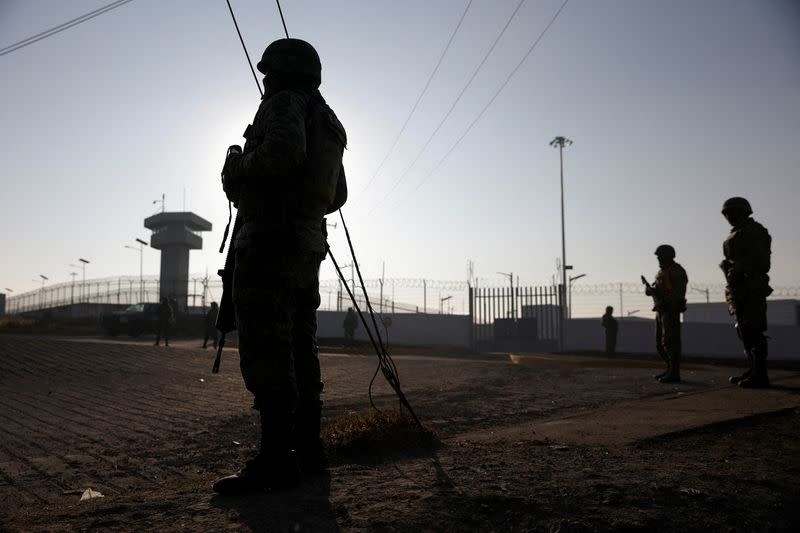Son of drug kingpin 'El Chapo' pleads not guilty to US trafficking charges
By Eric Cox and Joseph Ax
CHICAGO (Reuters) -Ovidio Guzman, one of the sons of incarcerated Mexican drug lord Joaquin "El Chapo" Guzman, pleaded not guilty to U.S. fentanyl trafficking charges on Monday in federal court in Chicago, prosecutors said, three days after his extradition from Mexico.
Guzman, 33, is one of El Chapo's four sons, known as "Los Chapitos," who inherited their father's trafficking empire after his conviction on U.S. murder and drug charges in 2019. "El Chapo" Guzman is serving a life sentence in a maximum-security prison in Colorado.
U.S. officials said Ovidio Guzman's arrest and extradition represents a significant victory in the Biden administration's campaign to stem the deadly flow of fentanyl across the southern border.
Security analysts, however, doubted there would be a major change in U.S. security ties with Mexico under President Andres Manuel Lopez Obrador, who curbed cooperation after assuming office in December 2018.
During a brief hearing under tight security, Guzman, wearing an orange jumpsuit with his ankles shackled, listened to the proceeding through a Spanish interpreter, the Chicago Tribune reported.
Outside the courtroom, Guzman's lawyer Jeffrey Lichtman told reporters his client was "not planning on cooperating against his brothers", who are some of the world's most wanted drug lords.
Guzman was briefly arrested in Culiacan in the northern state of Sinaloa in 2019. But Lopez Obrador ordered him released after hundreds of Sinaloa Cartel gunmen overwhelmed security forces in the city.
Guzman was captured again in January after an intense firefight. The U.S. requested his extradition in February.
At the time of his arrest Guzman was the principal figure for Los Chapitos' fentanyl manufacturing and distribution business, according to U.S. authorities, even though his elder brother Ivan is the overall leader of the powerful faction.
Ovidio controlled the first fentanyl lab set up by Los Chapitos around 2014 and has "overseen the explosion of their fentanyl trafficking activity and profits", according to an indictment unsealed in April by U.S. prosecutors in New York.
Guzman also established an "outpost" in Mexico City for bulk heroin purchasers go to buy fentanyl to mix with heroin, part of Los Chapitos' growth strategy to drive users of other drugs towards fentanyl, the April indictment said.
Two of the six counts Guzman faces in Chicago carry a mandatory life sentence, prosecutors said, according to the Tribune. The U.S. agreed not to pursue the death penalty as part of its extradition negotiation with Mexico, the Chicago Tribune said.
Guzman waived his right to a detention hearing and will be held without bail until trial, a spokesperson for the U.S. Attorney's office in Chicago said. His next court date is scheduled for November.
POLITICAL PRESSURE
Fentanyl, a highly addictive synthetic opioid, is responsive for nearly 200 American deaths a day, a toll that has strained U.S.-Mexico relations and put domestic pressure on the Biden administration to slow the spread of the deadly drug.
Guillermo Valdes, Mexico's former civilian spy chief between 2007-2011, said Guzman was probably extradited due to the intense U.S. pressure and to give Lopez Obrador's administration political breathing room at home, where opponents have accused his party of aiding the Sinaloa Cartel.
"It is good for Biden to have Ovidio already there (ahead of U.S. elections). And it helps Lopez Obrador to get rid of the image that he is protecting the Sinaloa cartel," Valdes said.
One former senior U.S. Drug Enforcement Administration (DEA) official said Guzman's extradition is unlikely to herald a change in approach by Lopez Obrador, and is designed to fend off criticism that Mexico's government is soft on drug traffickers.
"Ovidio is a sacrificial lamb," said the former agent who requested anonymity.
"He's one of those guys they’re able to throw out there and say 'we are doing all we can'. But it's all smoke and mirrors," the former agent said.
(Reporting by Eric Cox and Joseph Ax; Additional reporting by Kanishka Singh; editing by Grant McCool)



